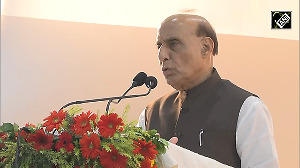Roger Federer's recent form strongly suggests he could win the French Open but the modest world number one is just focusing on surviving the first round at Roland Garros for a change.
"I really don't want to consider myself as the favourite," said the Swiss all rounder, who has disappeared from the highlight of the claycourt season in the first round for the last two years.
"I don't want to waste thoughts on possible semi-finals or quarter-finals," added the 22-year-old Federer, who warmed up for next week's French Open in style by winning the Hamburg Masters title for the second time on Sunday.
"I'll concentrate on my first round because that's what didn't work in the last two years."
The Wimbledon and Australian Open champion, who reached the number one spot in February, is still improving and is widely regarded as one of few players with the potential to win all four Grand Slams.
Last year he became the first Swiss man to win a Grand Slam singles title, at Wimbledon, and showed his versatility by winning seven titles on three different surfaces.
He has travelled on the circuit without a coach since parting company with Peter Lundgren last December but has kept up the success this year with his Melbourne triumph and three more titles.
HAMBURG BREAKTHROUGH
Federer, who has mastered all aspects of the game, proved he could do damage on clay two years ago, when he made his breakthrough by winning in Hamburg for the first time.
Last year he also won a tournament on clay in the build-up to the French Open, in Munich.
"The last two years I entered the French Open with high hopes and losing in the first round was very tough mentally," he said.
"I'm more relaxed now. I know whoever wants to beat me will have to play extremely well."
Federer's run in Hamburg, where he crushed Carlos Moya and Lleyton Hewitt before stopping Argentine Guillermo Coria's impressive claycourt streak in the final, was a clear demonstration that he can beat anybody on the slow surface.
But the previous week he had made a second-round exit from the Rome Masters, suggesting he needed time to adapt to clay.
"I was a bit worried in Rome but I tried to block that away because I knew it was just a matter of finding the right rhythm," he said.
"Now I'm serving better, returning better and I've got the groove, the balance and everything."







